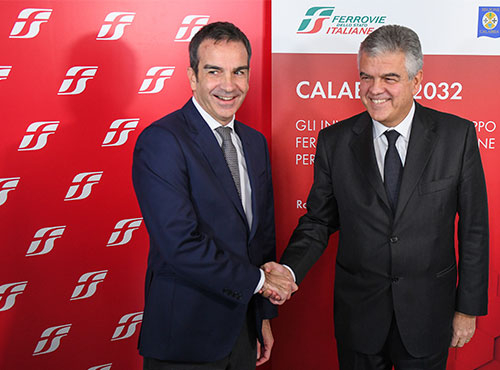FS Italiane: €13.4 billion investment in mobility in the Calabria Region
The main projects were presented today by the President of the Calabria Region, Roberto Occhiuto, and the CEO of the FS Group, Luigi Ferraris

Rome, 7 December 2023
Electrification and upgrading of rail and road infrastructures, new regional trains to lower the average age of the fleet, intercity connections with hybrid rail networks, and redevelopment of stations and urban areas. These are the priorities identified by the FS Italiane Group as it announces investments of €13.4 billion to make the Calabria region more connected, modern and competitive.
The key projects were presented today by Deputy Prime Minister and Minister of Infrastructure and Transport Matteo Salvini, who spoke via video conferencing, the President of the Region Roberto Occhiuto, and the CEO of the FS Italiane Group Luigi Ferraris at the FS Group headquarters in Piazza della Croce Rossa, Rome.
The investments outlined in the Group’s Industrial Plan and enabled through fund allocated under the NRRP will concern all the FS Group’s business units: Infrastructure, Passenger Services, Urban and Logistics, and will aim to affirm the strategic role for Italy and Europe of a region positioned at the very centre of the major links between the Mediterranean and the Continent, helping to reduce the infrastructure gap between south and north.
Infrastructure. The main actions are focused on infrastructure and include works on the Ionian railway line, aimed at electrification and increasing its reliability and speed, and the Salerno-Reggio Calabria railway line, a link that will bring high-speed rail to areas of high economic and tourist value and increase the speed of routes to cities already served by high-speed rail. As regards road connections managed by Anas, works will focus on the SS106 Jonica road, the A2 motorway, and the completion of the SS 182. The Santomarco tunnel is a particularly important project: while there are still many variables to be decided, whatever decisions are made regarding the final route, the outcome of the authorisation processes or the plans of the various high-speed rail lots of the connection to Reggio Calabria, the project will enable Cosenza to be connected to the high-speed network.
The investments will also benefit railway stations thanks to a dedicated plan aimed at improving their functionality and design, breaking down architectural barriers to improve train accessibility, and enhancing public information. The “New Railway Command Centre of Reggio Calabria” - containing the New Railway Circulation Control and Command Centre for the entire South of Italy - will also be constructed. The plan to eliminate level crossings is also progressing: to date, work is underway to remove 11 level crossings, while studies and designs are underway for 21 others.
Passengers. By 2025, more than 50% of regional trains will be replaced, with the average age dropping from 29 years in 2018 to 9 in 2026. Calabria has been chosen as a pilot region to trial the use of alternative fuels: last summer, five trains, including the brand new Blues hybrid regional train, began running on certain routes using HVO biofuel supplied by Eni. As regards medium and long-distance services, there are currently 16 Trenitalia Frecce connections to and from Calabria with stops at 10 stations, 25 Intercity connections to and from Calabria (of which two are periodic), and four bus connections. In early 2024, hybrid intercity trains will be introduced for connections on the Reggio Calabria-Taranto line.
Urban. The FS Urban Business Unit is set to be a major player in the urban regeneration of railway areas that are either currently disused or will be decommissioned in the future. The projects aim to support the development of the towns and cities around the stations and promote the self-production of energy from photovoltaic technology. A call for tenders in partnership with the municipality of Paola will soon be launched for the construction and management of a new marina to promote the integration of rail-water transport.
Logistics. FS’s Logistics Business Unit will focus on upgrading rail terminals to create new intermodal hubs. In early November, Bluferries, an FS Group company that handles passenger and vehicle ferry services in the Strait of Messina, joined the Logistics Business Unit. In addition, the Logistics Business Unit also operates in Calabria through Mercitalia Rail, with over 1,100 trains a year to and from the main sites in Calabria and a further 5,800 trains to and from Villa San Giovanni to Sicily, and Mercitalia Shunting & Terminal, a company specialising in the management of rail shunting services at ports and rail terminals.